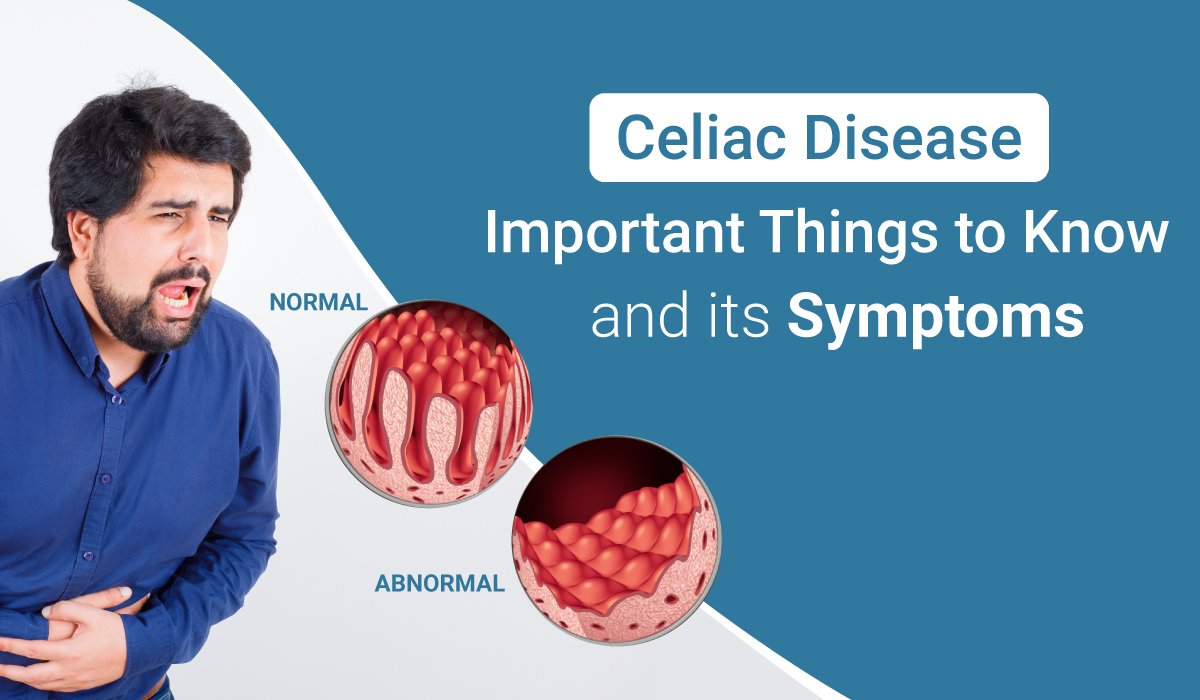celiac disease – important things & its symptoms

In some people the digestion of food items such as wheat, barley, rye etc, which contain gluten, causes an undesired immune response. This could be due to an autoimmune disease known as celiac disease. To simplify, autoimmune hepatitis diseases are the ones which run in families due to some hereditary defect in their genetics. This disease occurs both in adults and children. The immune response due to this disease damages the intestinal villi which play a key role in the absorption of nutrients. There is no specific cure of this disease and the patients must follow a lifelong gluten free diet. As the initial celiac disease symptoms are similar to those of wheat allergy, many people confuse the two conditions. It should be noted that celiac disease is a much severe condition.
What is gluten?
Food items such as wheat contain a set of proteins and one of them is gluten. Gluten is itself made up of a group of proteins such as gliadin and glutenin. Gliadin is the main component of this protein which causes celiac disease in patients who are incapable of breaking down the amino acids of this protein. As the components of this protein are unbreakable, the body considers those components as foreign invaders and release immune response.
What is the pathway responsible for celiac disease?
As we already know that if a person with this condition eats a wheat product, they automatically ingest some proteins, especially gluten. Also gluten is further made up of some other proteins, specifically glutenin and gliadin. Gliadin is a plant storage protein that is high in amino acids which are the key structural components of proteins and also help in storage and transport of nutrients. In respect to the amino acids present in gliadin which are responsible for this intestinal disease are proline and glutamine. The body of the patient with this disease is simply unable to break down these amino acids properly. As these unbroken amino acids cross the gut cells, the immune system gets activated and tries to capture them as foreign invaders. In this process of invading these amino acids, the immune system damages the intestinal villi.
What antibodies as responsible for this misjudged immune response?
As the person with this disease ingests gliadin for the first time, it reacts with TTG enzymes which lead to the formation of antibodies against it. The next time when this person is exposed to the gliadin, antibodies automatically get activated to kill it. The main antibodies responsible for this response are:
- Tissue transglutaminase antibodies
- Antibody IGS
- Endomyisal antibodies
What is the role of intestinal villi?
In order to understand the signs and symptoms of this disease and why there is a necessity to avoid gluten, we must make ourselves aware of the role of intestinal villi.
So, the villi are located in the lining of small intestine and are structurally like finger like projections. These structures aid in the absorption of nutrients by increasing the surface area. The villi are surrounded by a network of blood vessels which help the nutrients to getting easily absorbed into the blood stream. Each villi as a set of cells known as enterocytes which also help in regulate digestion. The damaged villi are flat and dead epithelial cells. Fortunately, if the patient with celiac disease remains off of gluten and there is no immune response in their body for a long time, these villi regain their structure and abilities.
What are some important celiac disease symptoms?
All these symptoms are the result of disturbance in the absorption of nutrients such as Vit B12 , folic acid and calcium and poor digestion
- Ulcers in the mouth
- Less blood count or even anemia
- Lactose intolerance
- Vomiting or nausea
- Unusual weight loss
- Delay in puberty
- Reduced growth
- Dermatitis
- Painful and irregular periods
- Obnoxious odor of stools
- Loss of hair
- Diarrhoea
- Changes in bones
How is celiac disease diagnosed?
Methods of diagnosis of this disease are as follows:
- Blood test to determine tTg, Iga and EMA serum levels
- Endoscopy with the help of scope
- Biopsy to look at the structure of villi
Are there any complications of celiac disease?
Patients suffering from this disorder can develop:
- Malnourishment which will affect every body system leading to problems related to bones, skin, mental health etc.
- Increased risk of cancer
- Possibility of the villi never getting recovered
How can celiac disease be treated?
There is no known treatment of this genetic disorder. However, doctors put the patient of a specific gluten free diet and may prescribe some supplements.
Some food items which are gluten free
- Meat
- Chicken
- Fish
- Grains such as rice, soy, corn
- Fruits and vegetables
- Nuts, beans and legumes
- Dairy products
Some food items to avoid
- Wheat products
- Barley
- Malt
- Beer
- Pasta
- Seasonings
- Canned soups
- Some breads
Conclusion
Celiac disease symptoms may grow in diversity with time if it is not kept in check. This is because celiac disease is associated with other autoimmune conditions such as type 1 diabetes, thyroid related diseases, hepatitis, biliary cirrhosis etc. The growth related symptoms of this disease worsen the complications. It is essential to get the proper diagnosis of this disease in order to check the severity of the condition. If you want to get yourself an accurate scan to diagnose this condition, contact Alfa Gastro and Liver care today.
